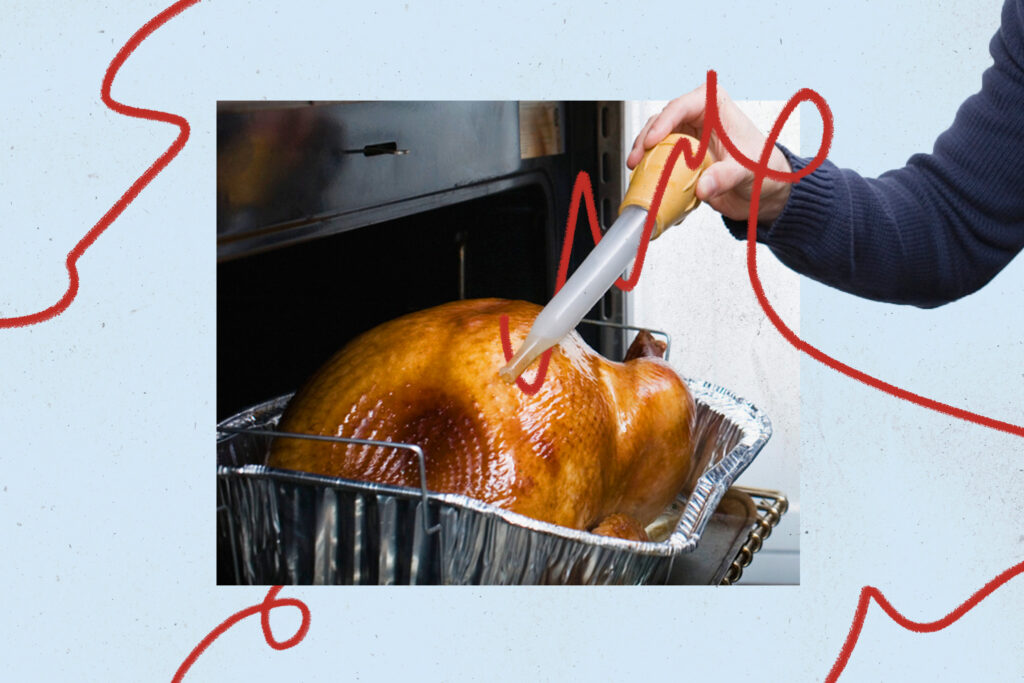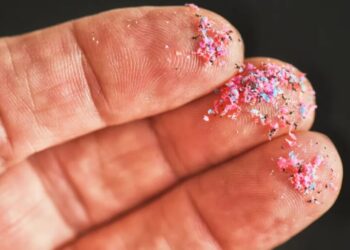Every Thanksgiving, I host dinner for friends and family. Of all the dishes on the table, including at least two kinds of pie, my pièce de résistance — each time — is the turkey. Moist, juicy and flavorful, it’s the dish that always gets the most compliments and requests for the recipe. It also happens to be the thing I spend the least amount of effort on. My secret to success, besides a digital probe thermometer? I don’t baste. And I’m here to tell you that you — yes, you — should stop basting, too.
I speak from experience: I haven’t basted in 25 years. From the moment the turkey goes in the oven, and until the internal temperature reaches 155 degrees, I pretty much set it and forget it. While I’m not usually someone who offers a hot take, especially one that will ruffle many, ahem, feathers, this is one of the few kitchen practices I’ve been passionate about for a long time.
Conventional wisdom and tradition tell us that basting makes the turkey meat more moist. It’s what our grandmothers (and their grandmothers?) have sworn by for generations. But basting as a technique for a juicy bird is a myth that doesn’t hold up to science. (The argument that this is how it’s been done in the past is not good enough. Just because our elders rinsed poultry, doesn’t mean we should.)
My induction into the anti-basting club came in the early aughts, when social media and virality didn’t yet exist. I was still in college and spent whatever free time I had reading recipes and watching Food Network, especially Alton Brown’s “Good Eats.” It was Brown’s arguments against basting — he called it “evil” — that caught my eye. For this barely-an-adult in my early 20s, hot takes, perhaps because they sounded bold and cool, were like catnip. I followed Brown’s instructions to end up with the best turkey I’d ever eaten.
I’ve been making Thanksgiving dinners since I was 14, but until Brown’s method, I was relying on the plastic pop-up timer and basting at 20-minute intervals. The turkey was always dry, and it made me wonder why this stringy bird was a holiday darling.
According to Brown, basting is not only ineffective, it’s also inefficient. The basting juices don’t penetrate the turkey skin, and each time you open the oven door, heat escapes, slowing down the cooking process, which prolongs the roasting time and thus risks dry meat.
To get even more details on the science, I reached out to Paul Adams, science research editor at America’s Test Kitchen, and asked him for his two cents on basting.
“Traditional basting has one advantage,” Adams said, “depositing dissolved proteins onto the skin, which facilitate the Maillard reaction.” That interaction of sugars and the proteins’ amino acids gives you browner and glossier — not crispier — turkey skin.
Adams is in the no-basting camp for similar reasons as Brown, calling the practice “not beneficial.” The myth makes sense on the surface, he said. “You’re putting moisture onto your turkey, therefore your turkey will be more moist. But the turkey skin is impermeable to moisture, so it doesn’t get into the bird.”
“When you cook a turkey, lots of moisture is evaporating. The skin is made up of 50 percent water, and in order for that skin to get crisp, all that water needs to cook off. It takes way more energy to evaporate water than it does to just heat water,” Adams said. Evaporating a water-based basting liquid also causes significant cooling. When that energy is drawn out of the turkey, it slows down the cook time and dries out the meat.
While Adams is against most basting, he thinks that basting with oil, butter or another fat a couple of times during the roasting process could be effective. The added fats help crisp up the skin and make it more flavorful. And because the fat limits evaporation, trapping the moisture underneath, the turkey would cook 20 to 25 percent faster, he said.
Adams acknowledged that some myths are harder to dispel than others, sharing that his own father, despite Adams’s food science cred, doesn’t follow his son’s advice. “My dad is a big baster, and we had a little argument about [this interview].” This Thanksgiving, Adams is going to focus on the vegetable sides — and look the other way when his father bastes the turkey.
The post Stop basting your Thanksgiving turkey appeared first on Washington Post.




